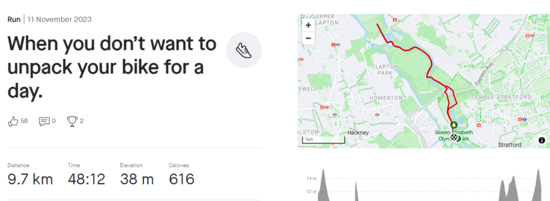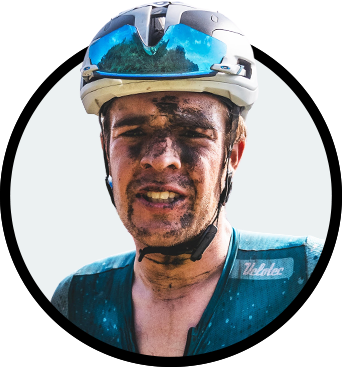The off-season. It’s a sacred time of year. That bliss period after the race season has concluded, yet before winter training has gotten under way. It’s a mental break, as much as a physical break.
The duration can vary, and ultimately depends on the season that an athlete has had. For pros, it can be anything up to four weeks, for amateurs just a week or two could suffice.
There’s no one-size-fits-all approach to doing an 'offie', but there’s definitely a wrong way to finding the balance between rest, exercise and preparing for the new season…
Fun
For many athletes, off-season is a return to ‘normal’ life. Going out on evenings, having that extra bit of food, or glass of wine. Effectively, it’s a period where you’re not worrying about the impact of every decision.
From my experience of the pro peloton, going partying with elite endurance athletes can be ‘interesting’. Some are, unsurprisingly, lightweights when it comes to drinking. But in true athlete style, the competitiveness will always come out, for better or worse.
We always have a few nights out each off-season. At the end of 2022, when I didn’t have a contract and was unsure of my place in the sport, I travelled around Europe and partied for a month. It was what I needed at that time and when I eventually kicked myself into gear, I was good come the start of the season.
This year was a touch tamer. There was one big night out in Barcelona, which is just down the road from my training base in Girona. We take the last train into the city at 11pm and the first train back at 7am. It’s safe to say I felt a touch worse for wear the next day.
But, as a rule, there was less time spent in nightclubs and more going for quiet evening drinks or meals with friends.
Fitness
Anecdotally, most pros take two weeks away from exercise. If you’re an avid Strava user, you’ve more than likely seen your cycling friends lace up their trainers. Running isn’t a bad thing if you ease into it and don’t run too far or too fast. Most cyclists don’t do that. Most will head out of the house without a warm up, and try to match Kelvin Kiptum’s world record-breaking pace straight away.
This will be followed by the agony of not being able to walk for the next few days. Maybe there’ll be one or two easier runs which are at half the speed of that first one and then the trainers go back into the cupboard for another year.
I took close to four weeks away from exercise this year. I took the traditional two weeks off, but then I picked up a sickness bug which stopped me from going on any easy runs. The impact of that has been minimal, maybe it will take me an extra week to get back to fitness but I’m not overly stressed.
I did do a few runs this off-season, but nothing major. One stands out in my mind which was around London’s Olympic Park which was good fun. Out with a runner friend, I was trying to hold myself back as much as possible, but in the end we still ran further and faster than planned.

It was the first time in my life that I’ve done a social run, in the past I’ve only ever run solo. Honestly, and I hate to admit this, I enjoyed it. Now, I’m not saying I’ll be doing any more runs in the off-season next year, but I’m starting to get it!
Prep
As the curtain starts to close on the off-season, it’s time to plan for the next year. Whether that be putting a race calendar in place and deciding how to reintroduce yourself into training. It’s the time to look back at both the successes and the failures.
My coach is based in Loughborough, and just before I started to seriously get back on the bike, I headed down to meet him in person. The modern world of Google Meet is great, but getting together over a coffee is unrivalled.
We talked about what we did well, what we did poorly and how we can learn from both the successes and failures. Last season was crazy for me, it was my first year starting my own thing, and a last-minute dash for sponsors took its toll.
I nailed the first half of the season, but not recognising the need for rest mid-year and getting a little arrogant with my fitness levels, led to almost two months of poor performance. Trying to figure out how to combat that was important - there are now more rest blocks planned for next season.
We talked through my physiology. I’m pretty poor at efforts under 60 seconds, which is an issue because they’re the efforts which win you races. The notion of working on your weaknesses is nothing new, and we’re going to do that, but not exactly. I’m still going to work on my sub-60 second power, but I’m going to focus a lot of my winter training on doubling down on my strengths.
I could spend all winter trying to be a good sprinter, but my natural physiology dictates that I’ll never be able to win a race from a bunch sprint. However, by doubling down on my climbing and time-trialling ability, I’ll hopefully be able to get away solo more regularly.
A successful off-season
At the ripe old age of 22, I like to think my off-season is a success if I get to the end of it craving a routine. I’ll have done a bit of travelling and relaxing, and I’ll get to the end of it wanting a stable sleep schedule or a big bowl of salad.
Off-season is about detraining. It’s about spending some time feeling a little worse for wear when it comes to physical condition. I've yet to come across an athlete, either physically or mentally, that can spend twelve months a year racing and training full gas.
I’m coming up to five years as a full-time athlete now, and I feel like I know my body pretty well to judge what it needs. My race season doesn’t truly start until the start of April, and as somebody who has traditionally been crazily fit in February, but not able to back it up the whole race season, I’m happy to take a little more time.
As I write this, I’m in my second week of training after my break. Fitness is coming back, I’m happy and I’m healthy. The last thing I want to do at the minute is go out partying, and that alone is a sign that I nailed off-season.
Until next year, you beautifully sacred time of year.
